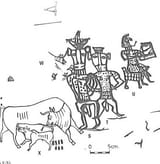>>17784955>The Enuma Elisha is a Sumero-Babylonian myth, it's doesn't reflect the Semitic spirit Mesopotamia issentially the fount of other Near-Eastern religions. Akkadian is a Semitic language, and the Akkadians upheld the myths in a way akin to the Romans in regard to the Greek religion. Why doesn't its influence count?
>Additionally, there's no internal evidence in the text supporting that Tiamat is linked to Chaos, on the contrary she is the mother of the Gods. You could say the same thing about e.g. Ymir or Pandu. It seems to be implied to be an embodiment of chaos.
>Ancient Egyptians were unrelated to Semites. Both genetically as they were R1b rather than J1 and culturally as they were agriculturalists rather than bedouins like the Semites. How could you know this with any certainty? The Egyptian language is closer to Semitic, and historically there was a far greater degree of intermixing in trade and war versus with Indo-European groups. There was also a large degree of cultural influence, e.g. the Egyptian gods were influenced by the Mesopotamian, Phoenicians used Egyptian-styled sarcophagi.
There is no clear-cut distinction between "Semitic" and "non-Semitic" religious systems in the way you seem to imagine. Religions and cultures cross-pollinate to such a degree that it is near impossible to unravel the threads.
This aside, I do agree that the broadly Canaanite streams of Near Eastern religion were largely as you describe them, that is, war-like and idolatrous. Although the ancient Israelites shared a high degree of superficial similarities with their neighbors, they were essentially unique in that they favored true monotheism (one all-powerful, transcendent God), and were concerned with an inwardness of consciousness and morality (rather than mere outward appearances). This, however, is beyond the current scope of discussion.
